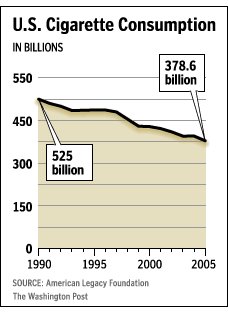
I smoked cigarettes for nearly 20 years. I gave up 15 years ago because I was getting bronchitis and asthma. Like many ex-smokers I am an anti-smoking bigot. I was delighted with the following from the Washington Post by M. Kaufman ' Smoking In U.S. Declines Sharply: Cigarette Sales At a 54-Year Low'.
Americans smoked fewer cigarettes last year than at any time since 1951, and the nation's per capita consumption of tobacco fell to levels not seen reporting began. There was a 4.2% decline in 2005 alone and an overall drop of more than 20% since tobacco companies reached a multi-billion dollar legal settlement with the states in 1998. ( According to this agreement US cigarette companies agreed to compensate the US states by $246 billion over 25 years. For the Viscusi critique of this agreement on the basis it penalised smokers rather than the cigarette companies, see here).
Still about 22% of high school students still smoke, as do 20.9% of adults and tobacco use remains the leading preventable cause of death, causing more than 400,000 deaths a year.
The decline in smoking began more than 20 years ago but accelerated after the settlement. The drop is a result of fewer people starting the habit, more people quitting and many cutting back on the number of cigarettes they smoke.
The sharp increase in the price of cigarettes since the settlement - from an average of $1.74 a pack in 1997 to $3.16 in 2004 - has been important in reducing the number of young people who start smoking. As economists we know that the demand of even addictive goods like cigarettes is quite elastic. Not surprised! But the agreement itself seems also to have had deterrent effects from the publicity associated with it.
I'll report on Australian cigarette smoking trends soon.



2 comments:
Did you put on weight after you gave up smoking, Harry?
Nicotine suppresses appetite, amongst other things.
I'd like to see you compare the decline in smoking rates in western countries to the increase in overeating in the same time frame.
Which is a bigger health issue?
Yes I put on a lot of weight - about 10%. The obesity studies do look at smoking quit rates. They do seem to have driven higher weight overall. The issue you identify a good one. I am doing work with Samantha Farmakis on this and will report on it over the next couple of weeks.
The health costs of smoking are overwhelmingly bad while the costs of being overweight are less obvious. If you are obsese you do have higher mortality. If you are just overweight then unclear.
I am very interested in weight. 2 claims that I think correct. If you want to live to an old age being a bit plump is better than being thin. If you are obsese you will have higher than average mortality but losing the excess weight may not reduce your mortality. You will have less diabetes and lower incidence of heart disease but still die more frequently.
Post a Comment